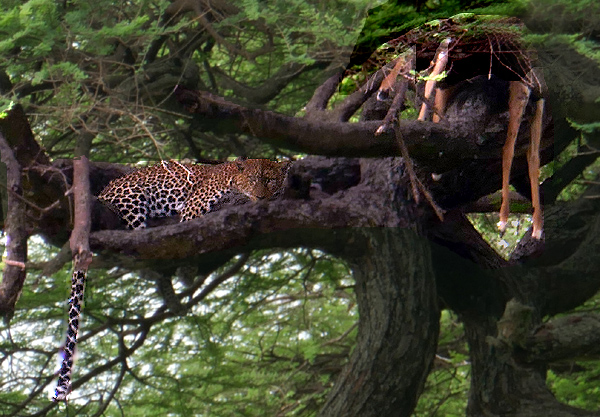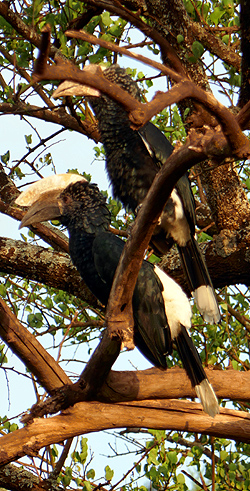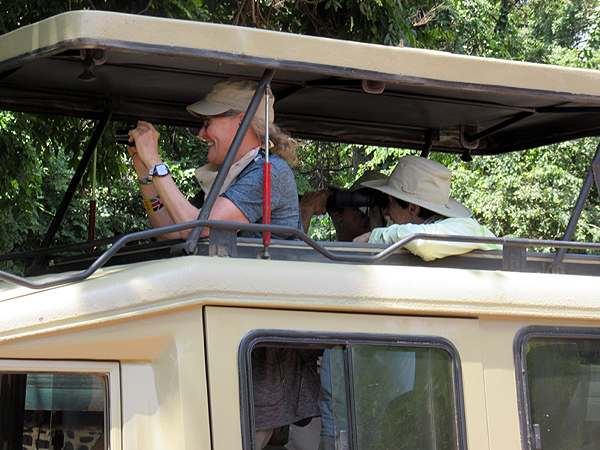
The Manyara forest was thick and opulently green after several weeks of sometimes heavy rains. The leaves on a dozen kinds of giant trees were newly green and spread wide opened, glazed as if waxed. Where there had been dust in the road there were now numerous puddles and muddy ruts with fresh, ginger-like smells.
A family of about 150 baboons wouldn’t even leave the track as we came along, so confident were they of their place in that blossoming jungle.

Thousands of white pelican funneled so high in the sky we lost sight of them. Hundreds more white stork and yellow-billed stork soared effortlessly between the forest and lake shore. An eery whistle preceded the swift landing of a hundred white-faced whistling ducks. Their arrival into the pool displaced the newly emerged water hyacinth like a green and yellow carpet being rolled out in front of us.
The leafless tree in the middle of the pool was a reminder of what I saw only a few weeks ago, the end of four very dry months that almost became a drought. Now the leafless branches held dozens of spoonbills and black heron sated with frogs.
A hundred grey and white pratincoles flew onto the edge of the swamp like a single flying carpet. Dozens of Egyptian geese waddled all over the now green savannah looking for bugs and seeds, their fat feet slapping the brilliant pink wild flowers. There were also several kinds of yellow buttercups and white tissue paper flowers and dozens of smaller blue and purple flowers.
Further down the savannah towards the forest were zebra and wildebeest, buffalo, warthog and impala. Everybody was grazing on the abundant, new growth. Everything seemed so unbelievably peaceful. But not everywhere.
We were in the park just after dawn, when the dawn light is so fantastic, blasting through the fissures and holes in the giant forest coloring the deep green. But hardly an hour before we arrived in the last of the night, the leopard made another kill.
He was fat, big and beautifully spotted after weeks of rain that had washed away his bawdiness and polished his aureate spots. During the dry season he would have had little difficulty picking off the weakened impala. Now that the tides had turned, it would become tougher with each rain as the impala strengthened and regained its vigilance.
But it would still be a week or more before that was widely manifest, so he probably still had the luxury of waiting until near dawn to make the kill. Then it would be easier for him to lift and push the carcass up the tree as the first glimmers of morning revealed the cuts and cleavages in the trunk that could help him move an animal twice his size 15 feet into the branches.
There is so much luck involved in game viewing. We were headed to breakfast at the Endalen picnic site adjacent the lake shore where I hoped to find the flamingos.
Tumaini was driving along pretty quickly. We were all so elated by the brilliance of the morning, the sonic grunts of the hippo still causing us to laugh, the majesty of the giant mahogany, Ficus and Celtic trees still trying to find room enough in our brain for a lasting memory.
T screeched the car to a halt and moved backwards quickly. We looked about 60 yards through a forest opening and there he was, the victorious cat.
When I saw him, his eyes were still closed, his face turned slightly down and directly towards us gently resting on his giant right forearm. He was draped over a big horizontal branch, a back and front leg hanging off each side of the trunk limply and his giveaway tail hanging down like a pull-switch.
It took me a while to see the fresh impala kill just to the right and above him. But Mariam was on the camera right away, because this extraordinary picture wouldn’t last.
His eyes opened but he didn’t move a whisker and his tale remained motionless. Despite his stealth he was facing the dawn and the light twinkled in his liquid amber eyes. He knew we were there and he knew we knew he was there.
He had been so tired lifting the impala into the tree. He’d fed himself well during the dry season, so he was probably less hungry than angry that the rains had come. After only a few bites he thought he’d get some rest before continuing. Now we’d interrupted that.
Justin pulled up behind us. Now there were two cars.
His head raised and I swear he frowned, if cats can do such a thing. I could see now what a large male he was, how powerful were his jaws.
He moved quickly above the impala and dragged it even higher into the tree. Had we not been watching, we would never have seen it, again. Now with binoculars piercing the scattered entries into the bramble, we could see he was feasting again. But not even that would last.
Tumaini had radioed Justin to come quickly, so of course now everybody in the park knew there was leopard and the cars began to come. No one knew where to look now, except us, because he had so magnificently tucked his quarry into the top inside of the umbrella acacia. Before we left, he jumped down and disappeared into the forest.
No other predator would be able to get his magnificent food. Vultures, which hunt by sight, would never find it. He was so big he certainly had kept away all other leopards. He could slither into the thick jungle and disappear until all the people had left. He’d probably return at sunset for another few bites.
Even though his muscular body and not too thin belly showed he wasn’t that hungry, he knew his dog days were over. He wasn’t exactly filling the larder, but he was getting ready for a tough time ahead, now. What had been the Days of Riley for the last four months for him had been a very stressful and challenging time for the impala. Those impala that survived on dead twigs and rotting swamp grass would now eat fulsomely the new bush leaves and wildflowers. They would grow stronger quickly. Their guard would be up again, their dangerous lethargy replaced by acute alertness. It would be hard for him, now, until that damn rainy season ended in June.
What was this? Four – five minutes? That’s all we saw, but the story started months before and would continue for months ahead until it wrapped itself back into this moment. Even now hours later I can imagine that pissed off leopard unable to sleep despite being totally hidden in a thick bush or distant tree, like all wild animals obsessed with an uncertain future having totally forgotten the victorious, cushy past.

excellently you described your trip…please share the pictures of all the creatures you came across especially the victorious cat.
Dear Albert,
Unfortunately, I don’t take pictures! If you email me at [email protected] I’ll put you in contact with the photographer. – Jim